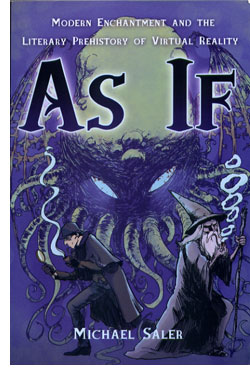 |
 |

Michael Saler
As If: Modern Enchantment and the Literary PreHistory of Virtual Reality
Oxford University Press
US Trade Paperback First Edition
ISBN 978-0-195-34317-5
Publication Date:01-09-2012
283 Pages; $27.95
Date Reviewed: 02-13-2012
Reviewed by: Rick Kleffel © 2012
Index:
Non-Fiction
Fantasy
Horror
Science Fiction
Mystery
General Fiction
Raise your hand if, because you read, you have been told, "You're living in a fantasy world." Our modern pact with day-to-day life demands that we give no particular credence to any other form of reality. To do so is seen as hedonistic escapism, or regressive religious primitivism. We're supposed to keep focused on the "just so" world.
Michael Saler makes a serious literary argument for the import of the world "as if" in 'As If: Modern Enchantment and the Literary PreHistory of Virtual Reality.' Making connections between the outburst of imaginative fiction at the end of the nineteenth century and the onslaught of "modernity," Saler examines the basis of our notions of story, of myth and the reality that we inhabit in order to read the books that allow us to perceive something more. Saler pulls apart our cultural embrace of seemingly opposing notions to re-draw the lines between fantasy and the literature of the fantastic. He maps the lands of enchantment with literary and cultural precision.
Saler is nothing if not focused. His introduction effectively lays out both a lexicon and a map of his intentions. He defines modernity and then goes on to discuss enchantment and disenchantment as aspects of how we embrace our world. "The efflorescence of imaginary worlds at the turn of the [20th] century...is best explained in terms of a larger cultural project of the West: that of re-enchanting an allegedly disenchanted world." The first two chapters of the book then lay out that argument in greater detail, looking at the transformation of how fiction itself was regarded, then stepping into the imaginary worlds and the adoption of these worlds into the public discourse.
Saler then follows up with three chapters on specific creations; the imagined worlds of Arthur Conan Doyle's Sherlock Holmes, H. P. Lovecraft's Cthulhu Mythos and J. R. R. Tolkien's Middle Earth. His analysis of each is unique, exciting and invigorating for readers of these works, and for that matter, anyone who is interested in how reading works itself into culture at large. The book is extensively footnoted and indexed, and the implications for our current interest in virtual worlds is noted. It seems destined to become a classic textbook that might capture the popular imagination as well.
This is not to say that Saler is writing poppy cultural chic. 'As If' is serious business and the prose reflects this. It's not a quick read, but it is the kind of book that will make you buy a second copy so you can underline the heck out of the first. It's also the sort of book that will transform everything you read before and even more so, everything you read after. Single sentences and questions will have lifelong reverberations. Saler is very smart, very perceptive and as enchanting, in his own way, as the literature he clearly holds in such high regard.
Reading Saler's analyses of your favorite works in the canon of the literature of the fantastic (and yes, Conan Doyle's Holmes stories are fantastic) is riveting stuff. He explores the nature of the literary community, and public spheres of the imagination as well as the private lives of the authors. He understands the merits of the works on their own, but as well their merits as parts of the public imagination. His visions of Doyle/Holmes, Lovecraft/Cthulhu and Tolkien/Middle Earth interlock to form a larger argument about the literature of the fantastic.
We're currently caught in an old argument about the anxiety-inducing introduction of virtual reality technology. Some of us who spent our youths in virtual worlds created on paper perceive those crafted in pixels with dismay. Like science fiction and comic books, video games are often portrayed as corrupters of youth. I'd be happy to point that finger had Mr. Saler not so deftly opened up a new vision not just of the literature of the fantastic, but of us as well. We are a story-based species, and we like a good story, a ripping yarn with monsters and adventure, a journey — that inevitably leads back to our lives. Ultimately, 'As If' tells us precisely such a story about the books we love, about how and why we love them.
|
 |
|
|
 |
| |
Review Archive
All Reviews alphabetized by author.
General Fiction
Non-Genre, general fiction and literature.
Horror
Supernatural fiction, supernatural horror and non-supernatural horror.
Science Fiction
Science fiction, science fantasy, speculative fiction, alternate history.
Fantasy
Fantasy, surrealism and magic realism.
Mystery
Crime, thrillers, mystery, suspense.
Non-Fiction
Non-Fiction, True Crime, Forteana, Reference.
Poetry
|
|
 |
|




